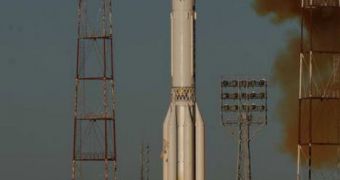Authorities in the Russian Federation announce that three satellites aboard a recently-launched delivery system have been lost in the waters of the Pacific Ocean, after the rocket that carried them delivered them to the wrong orbit.
The launch occurred yesterday, when a larger version of the renowned Proton rocket took off from the central steppes of Kazakhstan at around 5:25 am EST (1025 GMT), carrying three special satellites.
The three spacecrafts were to add to the existing Glonass constellation in orbit, which is the nation's response to the American-built Global Positioning System (GPS). Like the European Union and China, Russia too wants more localization capabilities than the United States are willing to offer.
As such, three of the latest instruments to be added to the Glonass-M navigation satellite constellation took off from the Baikonur Cosmodrome, the same launch facility from where manned Soyuz capsules make their way to the International Space Station.
According to Russian space officials, it would appear that the Proton rocket suffered a malfunction, which forced it to deliver the cargo to the wrong orbit. The satellites destabilized, and eventually plunged into the Pacific Ocean.
Early reports say that failure made the spacecraft hit the water some 1,500 kilometers northwest of Honolulu, in Hawaii, in an area of the Pacific Ocean that is rarely navigated.
“According to telemetry, the spacecraft's cluster was lofted into non-targeted orbit.” A committee was already set up to investigate "the cause of the contingency and to defined next steps,” explain officials at the Russian Federal Space Agency (RosCosmos).
“Three Glonass-M satellites fell into a non-navigational area of the Pacific Ocean in some 1,500 kilometers northwest of the city of Honolulu, administrative center of the state of Hawaii,” says the newspaper Ria Novosti, quoted by Space.
This is an important loss for the Russian plans, which already saw six Glonass satellites being launched this year. Three took off in March, and the other three in September. The new loss has set the constellation's construction back by a few months, but the delay is likely to be recovered soon.
All the alternatives to the GPS currently being built in Russia, China and the EU were brought on by the refusal of the US to grant foreign governments access to high-detail localization data.
Not even governments that are traditional allies have gotten this type of access, which the US reserves for its military. China could literally have no hope of receiving such data. So Beijing is building its own navigation system.
The Europeans and the Russians are animated by similar feelings. They hope that their new satellite systems will give them the autonomy they crave for.

 14 DAY TRIAL //
14 DAY TRIAL //